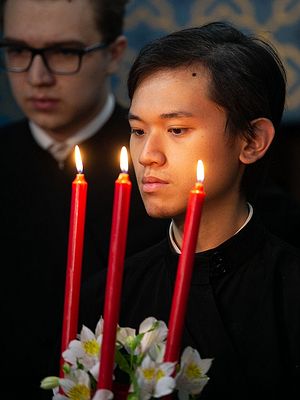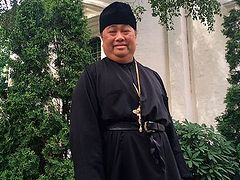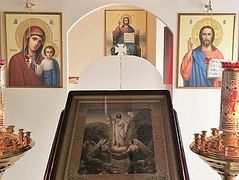Our hero is a remarkable young man. He was born and grew up in Indonesia. Raised in Protestantism, through a thorny spiritual search he found and embraced Orthodoxy and was even blessed to serve as a reader in the house church in the Indonesian city of Surabaya [an important port on the north coast of Java.—Trans.], where a small Orthodox community gathers. Later, on a priest’s advice, he decided to study medicine in Russia, and now he serves as an acolyte at the Old Church of the Protection of the Theotokos in the city of Rostov-on-Don in south Russia.
This story is about his spiritual quest, a difficult Orthodox mission in a faraway tropical country, the miraculous meetings and adventures in Russia of an eighteen-year-old Indonesian, whose sincere faith amazes even experienced Orthodox.
 Geraldio Lau Gefaldo, baptized into Orthodoxy with the name Sergius My name is Geraldo Lau Gefaldo. I was baptized with the name Sergius. I am eighteen. I am Indonesian and was born in Indonesia, but I also have Chinese ancestors: my great-grandfathers were emigrants.
Geraldio Lau Gefaldo, baptized into Orthodoxy with the name Sergius My name is Geraldo Lau Gefaldo. I was baptized with the name Sergius. I am eighteen. I am Indonesian and was born in Indonesia, but I also have Chinese ancestors: my great-grandfathers were emigrants.
Indonesia is a tropical country with huge cultural diversity. My native city is Surabaya on the island of Java—the second largest city of Indonesia. My country has enormous potential and is rich in natural resources. Residents of Indonesia are famous for their tolerance and hospitality—it can be said that these are our highest cultural values.
When it comes to religious life, there are many faiths represented in our country, but the overwhelming majority of our population is Muslim. There used to be numerous kingdoms across Indonesia where the major religions were Buddhism and Hinduism. A few hundred years ago Muslim preachers were quite active here, waging wars against Hinduism and Buddhism, and that is why today over eighty-five percent of our citizens are Muslims. Seven percent of the population is made up of Protestants of various branches, namely Calvinists, Baptists, Anabaptists, and others. In addition, three percent are Catholics. When Indonesia was a Dutch colony, representatives of the Roman Catholic Church did missionary work, so the history of Christianity in the country can be traced back to this period. Before that, representatives of the Nestorian Assyrian Church were active and built a church in Indonesia, which no longer exists and even its location is unknown.
Hinduism is practiced by one percent of the Indonesian population, and Buddhism is practiced by two percent. Of course, Orthodox are a tiny minority in this country. There are probably no more than 1,000 Orthodox living in Indonesia.
The path towards the Orthodox faith
For me this path was a very thorny one. Earlier in my life I was a Protestant and then an atheist. My parents are not religious, though they call themselves nominal Protestants. But once I reached a point in my life when I felt that I was withered and needed prayer. My soul was hungry for wisdom and some special knowledge.
I dabbled in occultism and spiritualism, read Buddhist and Hindu books. Then I became an atheist and felt an inner conflict. A teacher from my school showed me a Protestant church. I knew nothing of the faith and Christianity, but I didn’t feel peace of mind with Protestants—for me their services were like concerts, whereas I sought a different spiritual life.
My process of conversion to Orthodoxy was not an easy one because Orthodoxy is very different from Protestantism. I needed to scrutinize many things closely, and in fact I am still doing that. At first my parents thought that I had become a pagan (Orthodoxy and Protestantism are so dissimilar!), but I managed to explain everything to them and they finally accepted my choice. Having faith in God is the most important thing.
I set about searching for the origins of Christianity, read articles online and eventually discovered the Orthodox faith. After that I found an Orthodox church in Indonesia (of the ROCOR jurisdiction), then met with the priest and told him that I wanted to become Orthodox. I was baptized in October 2016, and in February 2018, Bishop George of Canberra ordained me a reader. I was baptized with the name Sergius, in honor of St. Sergius of Radonezh.
 Bishop George of Canberra, Reader Sergius and Reader George (on the left), and Subdeacon Bessarion (on the right)
Bishop George of Canberra, Reader Sergius and Reader George (on the left), and Subdeacon Bessarion (on the right)
In my native city of Surabaya I became a parishioner of the Church of St. Jonah of Manchuria, Bishop of Hankou. This saint preached in Northern China and is much venerated in ROCOR.
 The Holy Hierarch Jonah of Hankou
The Holy Hierarch Jonah of Hankou
Our community gathers at a small house church. We have twenty-five parishioners at the most.
Our parish priest is Fr. Kirill, and the rector is Archimandrite Daniel (Byantoro), head of the Orthodox mission of ROCOR in Indonesia. Earlier the Church of St. Jonah of Hankou in Surabaya belonged to the Patriarchate of Constantinople, but in 2002 it transferred to the Russian Orthodox Church Outside Russia. Services are celebrated in Church Slavonic and Indonesian and held every Saturday and Sunday.
 Archimandrite Daniel (Byantoro)
Archimandrite Daniel (Byantoro)
In my opinion, the Russian liturgical tradition is fuller than the Greek one. I saw this in our church. Yet our services are not full compared with services in churches of Russia, because not all liturgical texts have been translated into Indonesian. It can be said that the Orthodox mission in my native country has a herculean task to fulfil.
 With Fr. Kirill, the parish priest of Surabaya
With Fr. Kirill, the parish priest of Surabaya
My first meeting with Russian Orthodox believers took place in 2016 in Houston, Texas, where I took part in a youth competition and saw an Orthodox church (ROCOR) there. I attended a service in that church and felt something very special. I was given my first prayer-book there and I still use it.
The path to Russia
Fr. Kirill, the priest of my church, advised me to become a doctor. I looked over the lists of Russian universities with scholarship opportunities for international students like me where I could study chemistry and biology. I grew interested in the medical field, got a scholarship and can now study at a Russian university. Since October 2018 I have been attending the basic course at Rostov State Medical University. Next I am going to earn a medical degree in Novosibirsk. I am particularly interested in neurosurgery. In due course I also want to get a seminary degree.
This decision was a difficult one because everything is new for me in Russia. I live on my own, without my parents. My dorm mates at university come from different countries. Frankly, I am still adapting to life in the dormitory. For the time being our syllabus is rather easy because it is the basic course; learning Russian appears most challenging now because we are mastering not only the colloquial language but also the academic and scientific language.
I started learning Russian at home and even taught basic Russian a little in my city. But unfortunately, there was hardly anybody to practice it with in my home country.
In the spring of 2018 I went on a pilgrimage trip to Russia. Laurus, my friend and godfather who is currently a student of the Moscow Theological Academy, joined me for the trip; there were also believers from other cities of Indonesia. First we went to the town of Kolomna near Moscow, where Fr. Alexander, Fr. Kirill’s friend and former fellow-student at the Moscow Theological Academy, lives. Then we visited St. Petersburg and proceeded to Valaam. Our visit to Valaam concurred with that of Patriarch Kirill, who served the Divine Liturgy there on the feast-day of Sts. Sergius and Herman of Valaam Monastery. The Russian President came there too, and there were so many policemen present during those days that we were astonished…
Our priests from Indonesia received a patriarchal blessing on that day. To see His Holiness was something special for me. I think that was the will of God.
 Fr. Kirill, the priest at the church in Surabaya, receives the blessing of Patriarch Kirill of Moscow
Fr. Kirill, the priest at the church in Surabaya, receives the blessing of Patriarch Kirill of Moscow
A young acolyte of the Old Church of the Protection of the Theotokos
When I came to Rostov-on-Don in October 2018, I knew nothing of the Old Church of the Protection of the Theotokos. At first I found some information on the Convent of the Iveron icon of the Mother of God in Rostov on the internet, and, since I had some time before the beginning of my university studies, I paid a visit to it. When I arrived I inquired about parishes situated closer to my dormitory, and they told me about the Old Church of the Protection.
I came there and on one occasion confessed my sins to its rector, Archpriest Daniel Azizov. After confession he asked me: “Are you from Indonesia?” I showed him photographs of the church in my native city. In one of the photos I was wearing a cassock, and Fr. Daniel paid attention to this detail. Fr. Daniel asked me if I can read Russian or Church Slavonic and then suggested that I become an acolyte. The next day I came with my cassock and became an altar server here. I still read Church Slavonic very slowly and must improve my skills, so I cannot participate in the services as a reader at this stage.
I didn’t serve much before becoming an acolyte in Rostov. Here I feel joy and relief. The Lord has shown me the way, and I am very happy here. Everything is different from what I had in Indonesia. Here you can buy candles, see icons—not printed out images of saints but works of icon-painters. And there is this massive church building, and there are so many believers… This is all very interesting for me because you simply cannot find anything of this in my home country. In the little house church of my home town there is always the same scent of frankincense, but it turns out that there are so many different smells in churches!
I thank God for showing me all these things. Here I began to feel the profound joy of Church services. It is here that I have heard the Church texts that I didn’t know before as we had no translations. Little by little I am translating liturgical texts into my mother tongue—I am doing it with the help of my friend Laurus.
After becoming a student I realized how important it is to keep your balance. Currently, my life is a search for balance between the church and my university. I often come to the Old Church of the Protection of the Theotokos after my classes and after doing my assignments.
Russian culture through the eyes of a foreigner
I have noticed that Russian culture is neither completely Eastern nor absolutely Western—it is a blend of cultures. I think that is very good because it adopted the best elements of both the Western and Eastern traditions. This refers to human qualities as well. Perhaps it can be found only in Russia.
In Indonesia I would meet teachers from Western countries. They are great individualists, they organize the educational process very well, and they have a system for everybody. As for my Indonesian teachers and friends, they are oriented towards family values, the values of neighborhood and community.
This year I travelled by train to Kolomna and Sergiyev Posad on my own. I was amazed by the way Russian people celebrate the New Year. Everybody offered me treats on the train. This is that unique Russian hospitality.
I cooked Russian blini (pancakes) for the Pancake Week (Cheese-fare Week, just before the beginning of Great Lent) myself and treated my university teachers to them, and they were very pleased. I used a recipe that I found on YouTube. During my pilgrimage I tasted lots of Russian dishes. My absolute favorite dish is Russian borscht because it is very nutritious—it has both meat and vegetables. And kasha [porridge made from cooked buckwheat, rice or similar grain.—Trans.] is second only to borscht. I have tasted every kind of grain—buckwheat, rice, pearl barley, etc. I like that you can add virtually anything into kasha—and it will be fine! It is especially good for students.
 With his godfather Laurus at the Holy Trinity—St. Sergius Lavra
With his godfather Laurus at the Holy Trinity—St. Sergius Lavra
There are many foreigners living in my dormitory; they are mostly students from Arab countries and Africa. There are adherents of different religions among them, but the majority are Muslims. I have Russian friends, too. For example, I have a friend in Moscow who teaches chemistry at an Orthodox school. We first met in my native city, where she once came to attend a conference. And when I came to study in Russia, I spent several days with her family. During my pilgrimage I met many good Russian people, and I am still in touch with some of them.
A few months ago a miraculous event happened in my life. This winter I venerated the relics of St. Sergius of Radonezh, my patron-saint, at the Holy Trinity—St. Sergius Lavra. I had a strong feeling of gratitude, joy, and inner peace. I will continue my service…
 During the trip to the Holy Trinity—St. Sergius Lavra
During the trip to the Holy Trinity—St. Sergius Lavra
At the Old Church of the Protection of the Theotokos all the acolytes are older than me, and I’ve learned a lot from them. For me, serving here is the task that God has entrusted me with. This happened according to His will. It is like breathing, without which my soul dries out.
To be blessed for a ministry is something special. The Church is the Body of Christ, and Christ is the Head of the Church. Every member and every element of this Body matters.








